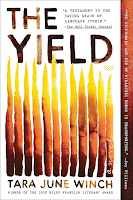yield, bend the feet, tread, as in waling, also long, tall -- baayanha Yield itself is a funny word--yield in English is the reaping, the things that man can take from the land, the thing he's waited for and gets to claim. A wheat yield. In my language it's the things you give to, the movement, the space between things. It's also the action made by Baiame, because sorrow, old age, and pain bend and yield. The bodies of the ones that had passed were buried with every joint bent, even if the bones had to be broken. I think it was a bend in humiliation, just like we bend at our knees and bow our heads. Bend, yield--baayanha.
August Gondiwindi is an Aboriginal Australian woman living in London. When her father dies, she races back to the small bush town where she grew up, and finds herself facing new traumas and old ones: there's the death of her father, of course, among the new, but also a new mining operation is threatening to push her widowed mother out of her house and destroy the land. Among the old traumas is the decades-past disappearance of August's sister Jedda, who still haunts the land. August finds herself prodding through the earth for clues once again, and even imagining that the funeral will bring her sister back at last. What August discovers, though, is that her father had been writing a dictionary of their language, Wiradjuri--and its record of "Native title" over the area might just be enough to stop the predations of the mining company.
Tara June Winch's The Yield is made up of three strands: the story of August's return; a long letter by an early 19th century German missionary that explains the history of oppression and violence the local Aboriginal people have faced; and excerpts from her father's dictionary. Of these, the dictionary is the most compelling; although I can think of other literary dictionaries (like Ambrose Bierce's), I don't think I've ever seen someone tell a story that way. August's father, in a kind of antipodean pique, goes through the English-to-Wiradjuri backwards, starting with yarran tree and ending with--what else--Australia. The definitions are reflective and personal, and not only manage to express something of an Aboriginal perspective on the world, but dole out, in pieces, bits of a powerful secret: his knowledge about Jedda's disappearance and his killing of the man who perpetrate it.
The other parts of the story didn't work as well for me. August never felt as real or interesting to me as her father, perhaps because the power of her grief gets crowded out by the plotty stuff about the mining company and the quest to save her mother's house and land. The story of Jedda, which gets told in such a fascinating way in the dictionary parts, never really gets integrated into the "main story," and the letter from the missionary seemed to me to be an awfully clunky and distracting way of providing the necessary historical context. Still, I was struck by the power of the novel's use of indigenous language as an instantiation of history and values; one thing The Yield makes clear is that the loss of the Wiradjuri vocabulary is as threatening as the loss of the land itself.
One thing I did find interesting about the novel is its exploration of syncretic Christian-Indigenous religion. August's father is a Christian who takes a lot of comfort in reading the Bible, but his dictionary reveals tensions between his Christian beliefs and traditional animist ones. The missionary, Greenleaf, describes intentionally blurring the lines between Christianity and traditional Aboriginal religion, allowing himself to describe Jesus as the "son of" the creator God Baiame. Toward the end of his letter, he expresses regret for this, describing it as a kind of lie. August's father describes, in his entry for "Biyaami's son," learning from an ancestor that they do not worship Biyaami or his son, but "the things He made, the earth." Biyaami's son "Gurra-gali-gali was just a son, a coincidence." This seemed to me to be an interesting contrast to novels in a North American Indigenous tradition, like House Made of Dawn, that often position syncretism as a kind of resilience.


No comments:
Post a Comment